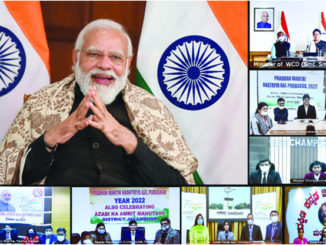
New Delhi (TIP) – The Supreme Court on Friday, March 24, restored the doctrine of “guilt by association” in criminal jurisprudence in India, as it overruled a bunch of its 2011 judgments and declared that mere membership of a banned organisation will be a crime under country’s anti-terror law — Unlawful Activities (Prevention) Act (UAPA), 1967. A three-judge bench headed by justice MR Shah affirmed the constitutional validity and the rationale of Section 10(a)(i), which makes continued membership of a banned organisation a crime punishable with a jail term up to two years. “It is observed that the object and purpose of the enactment of UAPA is to provide for more effective prevention of certain unlawful activities. To punish such a person who is continued as a member of such unlawful association which is declared unlawful due to unlawful activities can be said to be in furtherance of providing for effective prevention of the unlawful activities,” said the bench, which also included justices CT Ravikumar and Sanjay Karol.
It held that the three judgments of 2011 were “not a good law” in ruling that mere membership of a banned organisation would not incriminate people unless they resort to violence; incite people to violence or do any other overt act to disturb public tranquility.
Noting that the two-judge benches of the Supreme Court erred in reading down the UAPA provision in individual criminal cases on bail when there was neither any challenge to the law, nor an opportunity for the Union government to present its version before the verdict.
“It is true that it is ultimately for the court to interpret the law and/or particular statute. However, the question is not the power of the courts. The question is whether it be done without hearing the Union of India? When any provision of Parliamentary legislation is read down in the absence of Union of India it is likely to cause enormous harm to the interest of the State,” the court noted in its 144-page judgment.
In 2011, three separate judgments by the top court relating to cases involving charges under UAPA and the now-repealed Terrorist and Disruptive Activities (Prevention) Act (TADA), declared that mere membership of a banned organisation would not ascribe criminal liability on the accused unless there is material to show specific intent to further the illegal aims of the organisation or some overt unlawful acts. In doing so, the apex court heavily relied on US Supreme Court judgments which outrightly dismissed the doctrine of “guilt by association” and cited the right to free speech.
The Union government sought a review of the 2011 judgments, complaining that not only it was imperative for the two-judge benches to seek the Centre’s views at the time of hearing these cases but that reading down of the TADA and the UAPA provision impacted the prosecution of cases for unlawful association with banned outfits. Solicitor general Tushar Mehta appeared for the Centre.
Allowing the Centre’s plea on Friday, the three-judge bench disapproved of the previous views stating that before following American decisions, Indian courts are required to consider the difference in the nature of the laws applicable in the respective countries.
Even otherwise in absence of any challenge to the constitutional validity of Section 10(a)(i) of the UAPA, the top court said, there was no question of reading down of the said provision by the court in 2011, particularly in the wake of the legislative history and objective of UAPA.
The aim and object of enactment of UAPA is also to provide for more effective prevention of certain unlawful activities, said the court, pointing out that a particular association is declared unlawful only after the central government is satisfied that such association is indulging in unlawful activity and the same is against the sovereignty and integrity of India. Source: HT





Be the first to comment